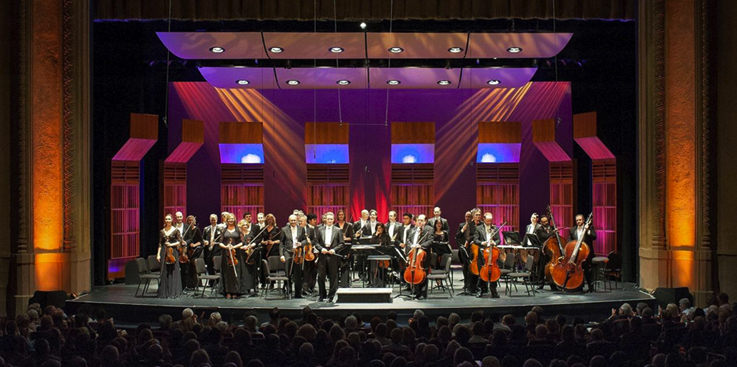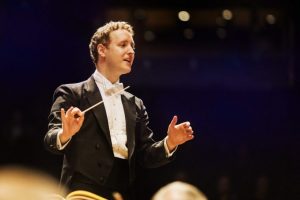The Mainly Mozart Festival Orchestra and soloists’ “Exotic Inspiration”

Mainly Mozart Festival Orchestra at the Balboa Theatre, used by permission of Mainly Mozart Festival
Thursday evening’s Mainly Mozart Festival Orchestra’s program entitled “Exotic Inspirations” at the Balboa Theatre offered much to commend it, with several reservations. The charming program of Mozart, Ravel and Mendelssohn broke no new musical ground yet demonstrated that concerts of tried and true standard fare are still capable of filling the house.
The Balboa Theatre never ceases to amaze me. The appealing jewel box provides a much-needed downtown performance venue with easy access and ample parking as just two of its attributes. As a sound space however, the Balboa is a disappointment. An aural reset is required since its visual opulence also seems to predict a sonic feast. On the contrary, one is inevitably greeted with much less sound and presence than a theater ought to deliver.
The same could be said of the Mainly Mozart Festival Orchestra. A perusal of the personnel would suggest a “dream team” of extraordinary musicians, many of whom are principals or members of some of the country’s leading organizations. Under Music Director Michael Francis’s capable baton, one ought to expect a first-rate musical

Michael Francis,
Mainly Mozart Festival Music Director. Used by permission of Mainly Mozart Festival
experience. Unfortunately, this summer-time engagement seems to be just a busman’s holiday where folks get to leave their native Cleveland, Los Angeles, Atlanta, etc. for the more salubrious environs of San Diego.
The lack of refinement in the performances leaves me wondering about the deficit:
- Is it that the musicians don’t feel compelled to play at their highest levels since in their minds, it doesn’t affect their contracts back home and after all, San Diegans are just country bumpkins in their sleepy, seaside burg who in any case wouldn’t know the difference between a fine performance and a mediocre one?
- Is it perhaps that Francis really doesn’t have enough time to craft great performances from his band?
- Or perhaps, does the notion of team actually supersede that of individual ability: the whole being greater than the sum of its parts, thus, noble players may not in fact, create an equally noble ensemble?
Whatever the cause(s), I am inevitably disappointed by the outcomes from this orchestra and this space, although Francis inevitably acquitted himself admirably.
The soloist on Thursday evening was the very fine violinist Augustin Hadelich. The man clearly knows a thing or two about fiddle playing, executing deftly, with extremely precise intonation, clear phrasing and wonderfully knit ensemble. His solo entrance in the opening Mozart Violin Concerto No. 4 in D Major, K. 218 brought to focus all the problems with this hall. His sound, at least by the time it got out to the house seemed puny. With his impressive technique and resume, it would be hard to believe that he is playing on a sub-standard instrument. But, where was his sound? Because Francis did a yeoman’s job of balancing his band with the soloist, I must conclude that the lousy acoustics of the Balboa were primarily to blame for Hadelich’s unimpressive sound.
The performance itself went as expected. By and large, everything was squared away: tempos were temperate; intonation didn’t cause any jarring, and Mozart’s music came across as it often does in the contemporary style–low excitement, no surprises and few mistakes. But is this really what our best musicians wish to settle for? Wouldn’t it be better to go out on a limb expressively and run the risk of perhaps not replicating the rehearsal and allowing for the inspiration of a live audience to inform the performance, perhaps surpassing the standard of a live version of a CD? I certainly would have enjoyed some risk taking. The Gallant style in the opening Allegro came out stodgy, the charm and sensitivity of the empfindsamer Stil of the Andante cantabile got left behind and the concluding Rondo was nothing if not predictable. Yet, all was delivered with precision, finesse and very few note errors, which, nonetheless, isn’t enough to create a compelling performance.
Hadelich was featured again on Maurice Ravel’s “Tzigane.” Properly sanitized of any errant Roma inflection, all was rendered as simulacrum. No feelings were hurt or patrons jostled by this less than exciting performance. Hadelich handled the solo part with professional precision and the orchestral playing, especially the amazing woodwinds were delightful, if not a bit snoozy. As I said, the man can play, and I am really looking forward to hearing him in more flattering surroundings than Thursday’s. As with the entire evening, Francis kept his charges nicely under heel and never buried his guest soloist.
Coming on the heels of the summer solstice, Thursday’s celebration aptly included a semi-staged rendition of Shakespeare’s Midsummer Night’s Dream set to Felix Mendelssohn’s incidental music. The works are two of my personal favorites from the two canons, ravishingly sung by soprano Sharleen Joynt and mezzo Julia Di Fiore. Eva Barnes’ Puck served as the captivating narrator.
Very few of Mendelssohn’s work qualitatively equal this incidental music, although Thursday’s performance was yet another example of these extraordinarily gifted, world-class musicians consistently failing to deliver the goods. The individual performances, especially those of the Philadelphia Orchestra’s principal flutist Jeffery Khaner and hornist Jennifer Montone were exquisite: examples of the contemporary orchestral players’ art performed at the highest conceivable level. Yet, when it came to the niceties of precise ensemble and cohesiveness, the orchestra simply fell short. I truly hope that the Festival’s Music Director can get to the bottom of the consistent underachievement from these remarkable players.


